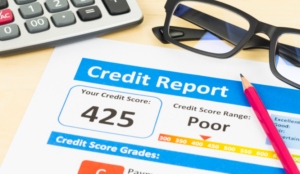
In this article we give an overview of the things you need to consider before applying for a mortgage if you have bad credit, including which products you are likely to be accepted for, how to give yourself the best chance of being approved and what to do if you are applying for a joint mortgage with someone with impaired or bad credit.
What is bad credit?
The details of your financial history, as well as personal data such as your address and date of birth, are recorded on credit files with the three main credit reference agencies:
- Experian
- Equifax
- TransUnion
They each come up with a score based on their own calculations, taking into consideration factors like your track record of making payments on time, how many credit agreements you have and whether you have run into debt problems in the past.
When mortgage lenders assess an application for one of their products, they will usually look at the credit score provided by one or more of these agencies, as well as using their own metrics to come up with a credit rating, based on their own assessments of your financial habits. Mortgage underwriters at each lender will follow guidelines and apply these to your personal circumstances.
While you don’t need a perfect credit score to secure a mortgage, the more impaired your credit is, the more difficult it will be to get approved for a mortgage as you are deemed a higher risk for lending. For example, for those who have recent CCJs, IVAs or bankruptcy on their file, it can be incredibly difficult to find a mortgage lender that is willing to lend to you. In some cases, your ability to improve your credit score may be limited. There are, however, a range of specialist lenders who are set up to service this part of the market.
Instant free mortgage advice
Our partner Habito is a leading online mortgage broker and will recommend the best mortgage for you
- Habito checks over 20,000 mortgages from 90 mortgage lenders
- 5-star rating on Trustpilot from over 5,000 customer reviews
- Can register online
What is a bad credit mortgage?
"Bad credit mortgage" is a term used to describe mortgage products available through specialist lenders that are more likely to approve applications from people with poor credit scores. They are sometimes known as “sub-prime”, “impaired credit” or "adverse credit" lenders and are characterised by the fact they offer more flexibility in their lending criteria than most high street lenders.
How do bad-credit mortgages work?
Even across specialist lenders that offer bad credit mortgages, there are differences in the types of black marks they will accommodate from potential homebuyers. A relatively large number of lenders may be prepared to accept minor infringements, such as a late credit card payment, while far fewer will consider those with defaults on mortgage payments or CCJs, for example.
As a rule of thumb, the more serious the issue - and the more recently it happened - the more of an impact it will have on your potential to get a mortgage.
Lenders will be stricter in their assessment during the application process and will typically require a larger deposit as well as levying a higher interest rate. The good news is the market has opened up over recent years, and there are generally options available for those with even the most seriously impaired credit scores. If you are looking for a mortgage but have a bad credit score, don't lose hope: while you may have to pay more and have a limited choice of lenders, it should still be possible to find a suitable deal.
For detailed information on how to get a mortgage with very poor credit scores, read our guides on getting approved for a mortgage when you have a CCJ, IVA or have been made bankrupt.
How can I improve my chances of getting a mortgage with bad credit?
When you are trying to find a mortgage with credit issues, it is imperative to use a good mortgage broker. This is because many of the specialist lenders will only accept applications through a mortgage broker/intermediary, which means members of the public can't access their products directly. In addition, an independent, whole-of-market mortgage broker will have a good understanding of the products that are available, the lending criteria the individual lenders use and which one is most likely to approve your application. They can also typically engage with the underwriters who will be looking at your application, explaining why you have a poor credit rating - their experience will guide you to share information that is likely to impact the outcome of your mortgage application positively.
If you are looking for a good mortgage broker, take a look at the online broker Habito* or check out our independent Habito review. Alternatively, you can find a list of recommended financial advisers through VouchedFor* or Unbiased*.
In addition to using a mortgage broker, you can also increase your chances of being approved for a bad-credit mortgage.
Ways to get a mortgage with bad credit
Check your credit score
While you may have a good idea that you have a less-than-perfect credit score based on your past financial behaviour, it is a good idea to see exactly what your score is to give you an idea of the types of mortgage products you may be able to access. As part of this process, it's wise to look across all three credit reference agencies, as they may record different information and will have different overall scores based on their own systems.
By checking your credit files, you will also be able to check the information the agencies have for you is correct and have the opportunity to correct any errors, which could, in turn, improve your score. Additionally, you may be able to identify ways to quickly elevate your score by, for example, registering for the electoral roll. For more information on managing your credit score, read our article "How to improve your credit score quickly".
Collect all the documents you need
To make the mortgage application process as smooth as possible, it pays to have all of the components you'll need organised in advance. This includes:
- Evidence of income: As affordability will be a key factor in determining whether you will be approved, gathering evidence of your income, including payslips, benefits statements or tax returns for self-employed applicants, is important.
- Details of "bad-credit" incidents: If you have had, for example, a CCJ, having evidence of when it was issued and the date it was satisfied will help your application. Similarly, evidence of how you have overcome debt issues in the past, including occasions where you may have come to an agreement with your creditors, may be useful.
- Bank statements: As well as your headline credit score provided by each of the credit reference agencies, lenders will also be looking at your spending habits. You will typically have to provide 2-3 months' bank statements, so it is worth considering reining in your discretionary spending over that period.
- Evidence of deposit/equity: Showing you have the required amount of deposit available will also be critical to your application. If you have the money in a savings account, such as a Lifetime ISA, having details of this will be helpful. Alternatively, if you are being gifted the deposit by a friend or family member, having evidence of this will also strengthen your case.
Choose the right mortgage for you
Your broker will be able to advise you, but you are more likely to be approved for a mortgage where, for example, you can comfortably afford the repayments and you have enough deposit available to secure a lower loan-to-value (LTV) deal. While it can be tempting to push the boundaries, if you apply for a mortgage amount that requires a high income multiple or choose a more expensive property that increases the overall LTV, this may lead to a higher likelihood of being turned down.
A good bad credit mortgage broker will know the lending criteria used by each lender and be able to gauge the right product and mortgage amount for their clients.
Getting a mortgage with someone who has bad credit
Applying for a mortgage with someone who has a poor credit history can make it more challenging to get the mortgage that you want but it isn't impossible. Your good credit won't negate the other applicant's poor credit score as the mortgage lender will consider both applicants when carrying out a credit check. Also, as with any mortgage application, the type of credit adversity and the time since will have a bearing on the outcome of your mortgage application. Lenders not only assess your creditworthiness, they also assess your affordability. This means that in some situations, a lender may offer the mortgage loan that you need based on how much the good credit applicant can afford. If you have a good credit history and you can afford to meet the mortgage repayment requirements, the other applicant with a poor credit history will have less of a detrimental impact on your application.
Remember that many lenders will accept minor credit misdemeanours like late or missed payments but you will find that a history of IVAs, CCJs or bankruptcies is likely to require specialist mortgage advice*. It is wise to seek mortgage advice if you find yourself in this situation to avoid applying to lenders that are less lenient when it comes to assessing your creditworthiness as declined mortgage applications will further exacerbate a poor credit score. A mortgage adviser will be able to guide you to mortgage lenders that are less selective when it comes to credit checks but you may find that you have to pay a higher rate of interest as the mortgage deals are usually less competitive. Improving your credit score over time will allow you to remortgage on better terms - we share more information about this in our article, 'How to improve your credit score quickly'.
Can I remortgage with bad credit?
Remortgaging with your current lender
If your current mortgage has reached the end of its initial introductory offer period and you have been moved on to the lender’s less competitive Standard Variable Rate (SVR), you may be looking to move to a better deal. If your credit rating has deteriorated since you initially took out your mortgage, it may be challenging to find a good deal, owing to a limited number of lenders being prepared to lend to you. If you end up pursuing a deal from a sub-prime lender, be prepared to pay a premium for doing so.
Although it isn’t guaranteed, it is often the case that, as long as you have maintained a good repayment record with your current lender, with no late or missed payments, they will move your remaining balance onto a new deal from their range without you having to be credit checked. It is worth checking with your mortgage broker whether this is likely to be the situation with your lender.
Remortgaging to release equity
If you want to remortgage and use the equity built up in the property to extend your mortgage borrowing, whether that is to pay down other debt or to fund other spending, such as for home improvements, you will need to go through a further credit check and complete a more thorough application process than if you simply move to a new deal with your current lender. Again, it pays to use a mortgage broker to find you the best deal. Additionally, a mortgage broker can advise whether any early repayment charges would be necessary as well as which lenders, including bad credit mortgage lenders are likely to approve your remortgage request. You will find more information about this in our article, "Remortgage to release equity from your home".
Can I get a buy-to-let mortgage with bad credit?
As with standard residential mortgages, it is now increasingly possible to get a buy-to-let mortgage even if you have a less-than-perfect credit history. While you may have less choice of lenders depending on how bad your credit rating is, there are specialist lenders offering buy-to-let mortgages for those with poor credit. A mortgage broker will be able to find you the best deal for your circumstances.
As you would expect, you can expect to pay a higher interest rate to secure a sub-prime buy-to-let mortgage deal. You may also need to contribute a larger deposit, in excess of the 25% that is normally required from standard buy-to-let lenders.
Should I buy a house with bad credit or wait to improve my score?
There are pros and cons of waiting to improve your credit score before getting on the property ladder. The obvious advantages are that you will have a much wider range of mortgage products to choose from and will probably be able to secure a much more competitive rate, which means your monthly repayments will be lower and you won’t pay as much interest over the lifetime of the loan. You may also be able to get a mortgage at a higher LTV ratio, which means you won’t need to have as much deposit available.
On the other hand, waiting to improve your credit score can be a lengthy process, with it taking 6 years for the most serious infringements to be removed completely from your credit file. That said, the impact past actions have on your credit score diminishes over time. A CCJ, for example, will have a less detrimental effect after two to three years from when it was filed, meaning you are more likely to be approved for a mortgage.
Overall, you will need to weigh up how urgently you need to move, how much extra you will have to pay on your mortgage if you apply with a poorer credit rating and whether you are able to pull together a large enough deposit.
If a link has an * beside it this means that it is an affiliated link. If you go via the link Money to the Masses may receive a small fee which helps keep Money to the Masses free to use. But as you can clearly see this has in no way influenced this independent and balanced review of the product. The following link can be used if you do not wish to help Money to the Masses - Habito, Unbiased, VouchedFor






